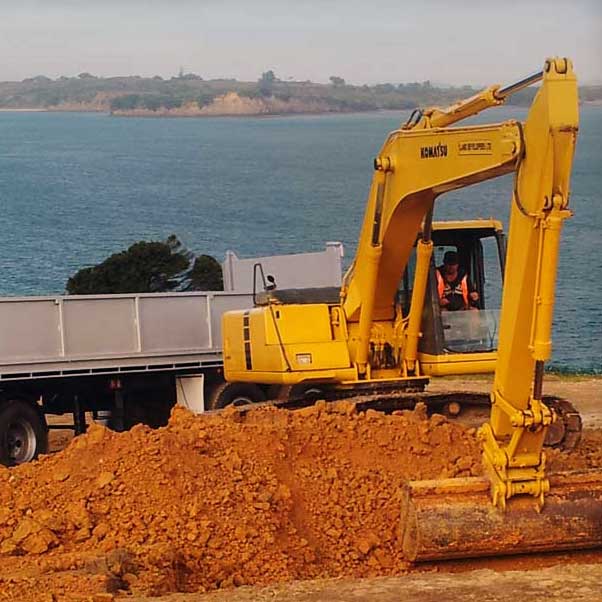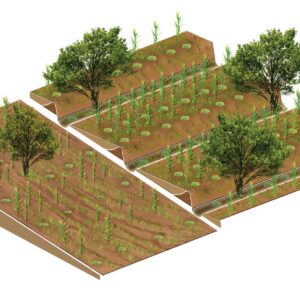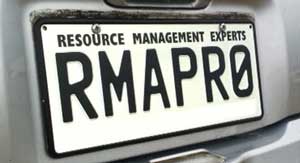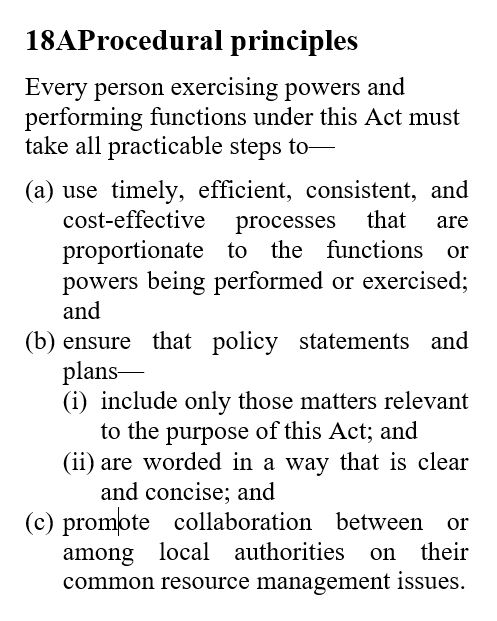Flat Farming on a Hilly Island
Hundreds of truckloads of clay are dug out of new development sites on Waiheke – mostly on the western half, and due to a lack of fill sites are trucked 50k or more per truckload to be dumped in permitted sites on the eastern end. It makes far more sense to invite lifestyle land owners to offer their slopes to have their topsoil removed, the slopes levels with excavated clean clay and the topsoil restored and the terraced land prepared for commercial market gardens. For it to work, the landowner pays nothing to prepare the land, and charges no ground rent for the farmers (but the host may get complimentary food).
LOCAL FARMING
It has to be run as a commercial enterprise, as a farming business, to the highest organic farming standards to ensure the host land owners and neighbours are happy with the land use, not irritated by noise, smells or spray drift.
LOCAL MARKETS
No food to leave the island, except in the bellies of happy visitors. The whole point is to enable Waiheke to become more self-supporting. At present, it is said that if the ferries stopped for three days, Waiheke would run out of food. Given the Covid supply line disruptions, Waiheke has had fair warning. It can’t live on wine and olives alone. It needs flat-land foods.
The Power of Permission

RMA Section 36AAA
Criteria for fixing administrative charges
- When fixing charges under section 36, a local authority must have regard to the criteria set out in this section .
- The sole purpose of a charge is to recover the reasonable costs incurred by the local authority in respect of the activity to which the charge relates.
- A particular person or particular persons should be required to pay a charge only—
(a) to the extent that the benefit of the local authority’s actions to which the charge relates is obtained by those persons as distinct from the community of the local authority as a whole

Need: Sustainable Council Department
Community Benefit Projects (see RMA Section 36AAA) operate differently than private applications for consents that benefit the applicant. They should not necessarily start with a particular parcel, but a sustainable concept. In this case, both reducing the carbon footprint and road damage of excavated clean-fill transport.
A Sustainable Planning Department would receive community-identified benefit projects, assess and recommend changes where they feel there is adverse impact (if any), and then work with the community to identify where such projects can be implemented. In most cases, the community, with its local knowledge, will already know. Then approve it. No charges to the applicant who may be a non-profit or a landowner volunteering their surplus land for the public good.
Specific Issues needing a council culture change

Council Costs
When risk becomes a barrier
The Building Act 1991 did huge damage to NZ when it spawned the mega billion dollar disaster of leaking homes. The responsible parties – architects, engineers and builders liquidated, leaving the council building-control authorities with joint and several liability.
In response, the Building Act 2004 drastically increased the cost of paper and eventually of materials and labour.
Risk-adverse councils began to require far more documentation from private-sector consultants, primarily to diffuse liability in the event things went wrong.
This spread from building consents to resource consents, especially as district/unitary plans were drafted by council planners who then left public service to set up consulting firms, charging applicants to negotiate the complex rules they wrote when in public service.
These costs and unnecessary complexity needs to be addressed, but in the interim, community benefit projects must be freed from these drop-dead costs and delays.
The RMA is supposed to enable communities and people.

Consultant costs
The cost of paper
The cost of consultant reports in community-benefit projects takes dollars from labour and materials to pay for paper.
With community-benefit projects, not only should Section 36AAA limit council charges, but Section 18A (Procedural principles) should be considered before demanding consultant reports:

The council must take all practicable steps to use timely, efficient, consistent, and cost-effective processes that are proportionate to the functions or powers being performed. The RMA can’t be much clearer than that.

Sustainable waste
Human waste is a resource
The simple acts of washing and using a toilet should not need to require $30,000 waste water systems, especially if urine can be processed as struvia and faeces converted to safe compost.
On Waiheke Island, engineers say clay soils require very expensive waste water systems, and in doing so dispose of waste rather than treat it as a surplus resource. This is a 20th century answer, outdated with advanced designs available today, sold by NZ experts.
In the local food project, there is a need for affordable housing for the food growers – see the next text box for one solution. But it is better if these affordable living units do not use waste water fields, but capture effluent, safely convert its caloric and fertiliser value so it becomes a surplus resource.
In the past council OK’s composting systems, but only if a conventional systems is also installed. They say it is needed if a future land owner does not maintain the composting system.
The better answer is a portable “wet pod”; a self-contained mobile unit with a waste-capture separator toilet, grey water shower and bio-capture kitchen sink. This ensures if the land use changes, the system is removed.

Mobile Homes
Mobile homes are affordable
On Waiheke Island, housing has become unaffordable because wealthy people own multiple homes including their holiday home on Waiheke, retired people downsize and can pay a lot more, and Airbnb conversions are more profitable than low-income rentals.
To do local food, the growers need affordable housing. But the need extends beyond growers.
- To work in the cafes and restaurants, the workers need affordable housing
- To remain on the island, pensioners need affordable housing
- Waiheke High School graduates, now are forced out of their community when they become young adults, need first-home affordable housing.
Mobile homes are an ideal interim 15-year solution to enable the proposed council community-benefit planning department to find permanent solutions. They can be licensed to ensure their low-income occupants pay for council services in lieu of rates.
But first there needs to be policy within Council that must lead using its power of permission. And this needs to start now, not decades from now. The crisis has become an affordable housing emergency.